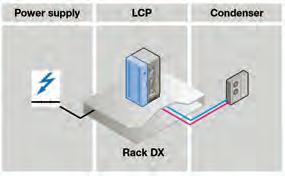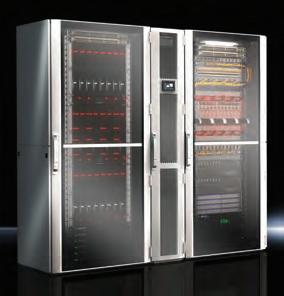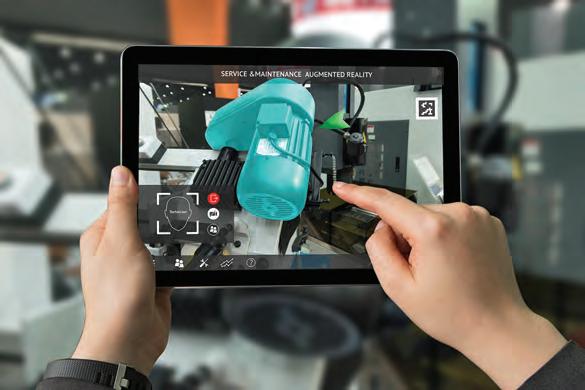
7 minute read
IMPORTS SIMA amendments empower manufacturers to take on unfair foreign competitors more effectively
Manufacturers are empowered to deal with unfair foreign competitors more effectively.
BY MICHAEL MILNE
Canadian trade prospects had never been more uncertain than they were in 2018 and 2019. Relations with the US were in doubt as our neighbour to the south engaged in an all-out trade war with China and battled global steel imports.
This led to the federal government directing the Canadian International Trade Tribunal (CITT) to examine steel imports. It was tasked to determine whether tariffs should be put in place to protect the domestic industry from diversion of US imports.
Although the CITT decided tariffs were unnecessary in five out of the seven product groups, the federal government engaged in a 30-day intensive consultation with the Canadian steel industry to identify other ways to strengthen trade laws. As a result, the Liberal government decided to enact new tools to give Canadian producers in all industries greater firepower to fight unfair imports.
With little fanfare, the Special Import Measures Act (SIMA) was amended in September. Its amendments bring Canadian trade laws into conformance with the US and Australia. These amendments give Canadian authorities the ability to unmask unfair trade practices that might otherwise go unpunished.
Under SIMA, a manufacturer can seek to have import duties imposed on a foreign competitor’s product if imports are “dumped” and if the dumped imports have caused injury. Both are complex determinations. Dumped imports are goods that enter Canada at prices below what the same goods sell for in the competitor’s home country, or if sold below the cost of production. Injury is caused if sales are stolen from the domes
Dumping PROTECTION SIMA amendments bring Canadian trade laws in line with the US and Australia. PHOTO: NESPIX - STOCK.ADOBE.COM
SIMA AMENDMENTS TAKE ON TRADE CHEATS
tic supplier; or the supplier is forced to lower prices to retain sales; and if these losses have a material impact on revenue, financial and operational results.
Filing a complaint When a complaint is filed, the Canada Border Services Agency (CBSA) investigates whether the imports are dumped. During its investigation, the CBSA requires the foreign competitor to report its home market selling prices and its costs of production. The CBSA then spends several months probing these reported prices and costs, asking for supporting documents and explanations for any data anomalies. For the foreign competitor, the investigation is invasive and requires significant time and cost to complete.
Prior to September, the CBSA would rarely look behind the foreign competitor’s reported costs. If these costs reasonably reflected actual incurred costs and the costs were verifiable by reference to supporting documents produced in the ordinary course of business, they would be accepted at face value. This has allowed foreign manufacturers to benefit from unfairly low-priced costs because there was no mechanism to challenge them as reported.
Now one SIMA amendment gives the CBSA the ability to find costs incurred in countries subject to significant government control or other market distorting circumstances are not reliable. In these cases, the CBSA can use surrogate costs to determine whether the foreign competitor is dumping.
Does your foreign competitor benefit from subsidized inputs produced by a state-owned giant (such as steel throughout Asia)? Or wild currency fluctuations (currently occurring in Turkey)? In both circumstances, the CBSA can find there exists a “particular market situation” and use this finding to ignore reported costs. This makes it much more likely for the CBSA to find that dumping has occurred.
Another import measures amendment allows the CBSA to disregard reported acquisition costs for key inputs obtained from affiliated suppliers.
Do you compete against a vertically integrated foreign competitor that sources raw materials or key inputs from sister companies at unfairly low costs? The CBSA can disregard a competitor’s paid costs and build its costs of production using a benchmark price.
Bottom line, Canadian manufacturers now have access to important tools that were available to their US and Australian counterparts for years. Trade laws are meant to level the playing field for producers selling at home. These new tools will allow them to do just that.
Michael Milne is international trade counsel with Cassidy Levy Kent LLP in Ottawa, which specializes in international trade disputes, export control compliance and customs issues. Call (613) 368- 4149. Visit www.cassidylevy. com.
Sponsored Content provided by PLANT partners: Creativity & Connectivity through Cool Urban Spaces!
Along with Rittal, a developer of distinctive urban workspace and data centre space in Canada’s major cities, provides knowledge-based organizations with unique environments for creativity and connectivity.

Design Dilemma The Company was known initially for its leading role in the emergence of Class I workspaces, a format created through the adaptive re-use of light industrial structures to satisfy the needs of the most demanding office and retail users. Subsequently, their business expanded to urban missed-use properties and focused on urban intensification, as Canadians flocked to downtown locations to live, work, learn and play in greater numbers. This resulted in a two-fold problem: • Lack of space in concentrated downtown office areas • Rising costs of grade A1 office space being converted into IT Rooms, resulting in a loss of revenue
The organization was looking to reclaim unused space in basements, parking or “grey areas” of buildings to be converted into smaller Datacenter Solutions that did


not require “white room” conditions (Lab level clean rooms). They wanted to offer the solutions as a ‘Co-location of Rack space’ to their tenants in order to recoup the office floor space and add a new revenue stream.
Creating Cool Solutions When Rittal reviewed the project, they realized that there was definitely a solution to the challenges being faced. Climate control concepts from Rittal cover the full spectrum of applications, from cooling a single rack to entire data centres. Security plus optimum energy and cost efficiency are paramount. A diverse range of technical solutions creates individual climate control concepts for racks, suites and rooms. • Scaled-down Cooling & Installation: It was noted that a key requirement was lower cooling per rack, as well as quick and simple installation (where a Chilled water or larger commercial room cooling solution was not able to fit within the space). • Hybrid Design: Rittal saw a unique opportunity to offer an Edge LCP DX Solution in a Hybrid design. The front of the rack with LCP DX coolers would be a rack-based cooling solution that would blow cool air across equipment behind the glass doors to capture 100% of the cooling, while the back of the racks were designed with room heat exchange to capture not only the heat rejection from racks but from an uninterruptible power source (UPS) also located in the room.
• Exterior Locations: The condenser units were positioned outside the building above a pedestrian walkway to avoid damage or obstruction. Due to the size, the units could be mounted on most exterior locations in urban areas which is useful when there is no availability of chilled water or sufficient space to place a larger roof cooler. • Space- saving: Minimal space was required for the redundant version by consolidation of cooling circuits in one unit. • Speed of delivery: The project took very little time from order to delivery to installation, minimizing downtime and not disrupting daily business. • Flexible design: With the flexibility in design provided by Rittal, the racks and coolers could be moved to other locations (within the building or a new location across town). • Minimal investment: The solution offered the opportunity to fulfill the current project objectives, and then grow on demand (pay as you grow).


Tim Rourke, President, Rittal Systems Ltd. said, “Rittal is delighted to support the creation of memorable urban workspaces in Canada. We specialize in developing customized IT cooling solutions for nontraditional IT environments, utilizing our diverse portfolio of data centre solutions to meet our client’s goals of achieving the highest levels of creativity and connectivity!” For more information, visit www.rittal.ca/datasolutions or contact marketing@rittal.ca. © ZHU DIFENG – STOCK.ADOBE.COM
Discover the Edge. Smart Solutions for Real Business.

Rittal Edge Data Centre Solutions: Quickly and easily build IT infrastructure on demand to meet the challenges of Industry 4.0 and the Internet of Things (IoT)










